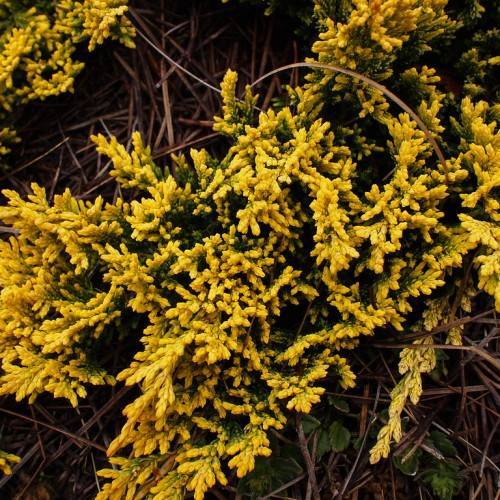
creeping juniper
Juniperus horizontalis 'Mother Lode'
Cycle:
Perennial
Watering:
Minimum
Hardiness Zone:
2
Flowers:
Flowers
Sun:
Full sun
Soil:
Sandy Loamy Clay Rocky
Fruits:
Fruits Ready In Fall
Leaf:
Yes
Growth Rate:
Low
Maintenance:
Low
Drought Tolerant:
Yes
Salt Tolerant:
Yes
Care Level:
Low
watering
Creeping Juniper (Juniperus horizontalis 'Mother Lode') should be watered moderately and consistently. It's best to water it once per week during the summer season, making sure to saturate the soil and avoid overwatering. During the winter, water less frequently, usually about once every 2 or 3 weeks, as the weather is cooler and the plant is semi-dormant. Make sure you check the soil moisture with your finger before watering – if it feels slightly damp, there’s no need to water. Similarly, if you’ve recently had heavy rain, there’s no need to water.
sunlight
Creeping Juniper (Juniperus horizontalis 'Mother Lode') requires full sun to semi-shade. It prefers 6 or more hours of direct sun per day for healthy growth, and less than 6 hours of direct sun can lead to sparse and unhealthy foliage. During the hottest part of the year, midday shade may be beneficial in preventing sunburn. For optimum health and coloration, a minimum of 4 hours of strong morning sun and 4 hours of afternoon sun is best.
pruning
Creeping juniper (Juniperus horizontalis 'Mother Lode') should be pruned 2 times a year: once during winter and once during spring. In winter, pruning should be done in the late winter, once regrowth has occurred but before new growth begins. Pruning should be done to help maintain the desired shape of the plant and to remove any dead, damaged, or mis-shapened branches. Pruning should not be too severe, and should only remove a few inches of the branch tips. In spring, pruning should be done lightly to remove any excess growth. The branch tips should be snipped back no more than 2 to 3 inches in order to maintain the desired shape. Overall, creeping juniper should be pruned lightly and often, especially during the 2 times a year in late winter and spring.
